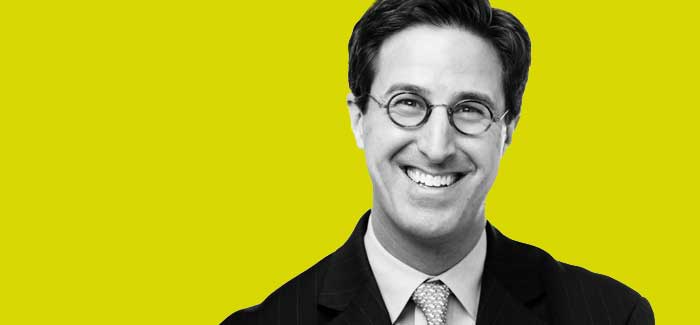
(Photo courtesy University of Chicago News Office)
From public radio to politics
Checking in with Steve Edwards almost a year into his transition from public radio host to Institute of Politics deputy programming director.
For years Steve Edwards was most familiar to Chicagoans for his comforting blend of agreeable authority as the host of 848 and Afternoon Shift on WBEZ, the city’s National Public Radio affiliate. Last summer, after a dozen years with the station, where he also served as director of content development and program director, he made the move to the University of Chicago to serve as the Institute of Politics deputy programming director. Last summer I interviewed him for WBEZ as he transitioned into his new role, and I caught up with him once again to see how he has been settling in.
What’s an average day for you like at the Institute of Politics?
As I’ve said to others, working at the Institute of Politics is a bit like combining the energy of a great start-up with the content of a great newsroom and the cultural and intellectual stimulation of a great university. For me, that’s an ideal mix. The institute runs three distinct but complementary programs: an ongoing series of public events with leading voices in politics and policy, a program for visiting fellows, and a program that connects students to internship opportunities and civic engagement projects. So a typical day might include planning a major symposium on immigration reform, followed by hosting an off-the-record seminar for students with the acting director of the CIA. One minute we’re discussing applications for our visiting fellows program; the next minute we’re working directly with students to discuss internship opportunities in Washington, DC, and field projects on the South Side of Chicago. It’s exciting, inspiring stuff.
You’ve covered politicians as a journalist: what did you learn about them working at the institute that you didn’t know before?
It sounds like a cliché, but I’ve been struck by the genuine civic commitment most people in politics and public service bring to their jobs. It’s palpable and it’s not often reflected in the media or in the partisan flamethrowing that so dominates our sense of politics today. I’m also struck by the level of respect that exists across party and ideological lines among practitioners, which is something we saw repeatedly during some 15 different programs we hosted this winter with top Romney and Obama advisers. Even though they battled fiercely in the election, they exhibited a mutual respect for each other that was surprising and encouraging. I think one of the things the institute and our students have been able to do is to model a different kind of conversation and create conditions for candor that, frankly, can be hard to achieve in the 24-7 media firestorm.
Who have been some of your favorite guest speakers thus far?
We hosted more than 159 guest speakers this first year, including former Republican presidential candidates Jon Huntsman and Newt Gingrich, newly nominated UN ambassador Samantha Power, Massachusetts governor Deval Patrick, former secretary of state Madeleine Albright, former Florida governor Jeb Bush, and New York Times Magazine correspondent Matt Bai, to name but a few. So it’s hard to choose favorites. The fact that so many policy makers, elected officials, and journalists have taken time out of their hectic schedules to engage with the students speaks volumes about this University, the institute, and David [Axelrod, AB’76].
What do you think the institute needs to cover or address in the future that it may not be focusing on thus far?
The enthusiasm for the institute and the level of participation on campus this first year has been truly remarkable. Even so, we know we can do even more to reach further into all corners of the University community—and beyond. We want to ensure we’re continuing to diversify the range of topics and speakers, with a specific eye toward boosting our programming on both international affairs and urban affairs. We think there’s an opportunity to leverage our location in Chicago as a way to bring together some of the most thoughtful and influential leaders on urban politics and policy from around the globe. We also want to get more creative and innovative in some of our programming formats and expand our digital media presence.
What are the top nicknames for David Axelrod around the office, and do you prefer him with or sans mustache?
Hmmm. I think there’s a general consensus that Axe-post-stache is preferred to Axe-with-stache. But we’d need to run some focus groups and hire a formal pollster to know for sure.
